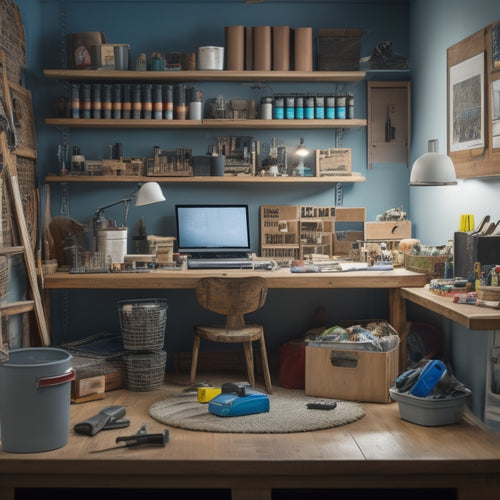
What's Holding You Back From Digital Decluttering?
Share
You're not alone in your digital clutter struggle. Emotional attachment to memories stored in your digital space is holding you back. Fear of deleting important files or missing out on crucial information is overwhelming. The constant barrage of notifications, updates, and alerts is exhausting. You're anxious about letting go of digital items, and uncertain about where to start. You're stuck in a sea of information, feeling guilty about the digital clutter that's piling up. But it's time to take control. By acknowledging these challenges, you're already taking the first step towards a clutter-free digital life - and there's more to explore to get you there.
Key Takeaways
• Emotional attachment to digital items and fear of deleting important or sentimental files hold people back from digital decluttering.
• Information overload and anxiety caused by excessive digital data prevent individuals from tackling digital clutter.
• Feeling overwhelmed by constant digital notifications and updates leads to digital paralysis, making it difficult to take action.
• Fear of missing out (FOMO) on important updates, news, or messages perpetuates information overload anxiety and hinders digital decluttering.
• Overwhelm from digital noise, such as constant notifications and updates, causes mental exhaustion and makes it challenging to focus on digital decluttering.
Fear of Letting Go Digitally
As you stare at your digital storage, you're likely holding onto a staggering amount of data, files, and memories, paralyzed by the fear of deleting something important or sentimental. You're not alone in this feeling. Many people struggle to part with digital items due to emotional attachment.
You might be worried that deleting a file or photo will erase a cherished memory or piece of your digital legacy. This fear is understandable, but it's essential to recognize that holding onto everything can lead to digital clutter, making it harder to find what's truly important.
To overcome this fear, start by acknowledging that your digital legacy isn't defined by the number of files you keep. Instead, focus on curating a selection of meaningful items that truly represent your memories and experiences.
Ask yourself, 'Will deleting this file or photo truly erase the memory or impact my digital legacy?' Be honest with yourself, and remember that keeping everything can lead to a digital mess that's overwhelming and stressful.
Information Overload Anxiety
You're not alone if you're feeling overwhelmed by the sheer amount of information coming at you from all directions.
It's easy to get caught up in the fear of missing out or worrying that you're drowning in a sea of data.
As you start to tackle your digital clutter, it's essential to acknowledge and address the anxiety that comes with feeling overwhelmed by the noise.
Data Drowning Feeling
Your digital life is likely flooded with a constant influx of emails, notifications, and social media updates, leaving you feeling overwhelmed and anxious about the sheer amount of information you need to process.
This data drowning feeling can be debilitating, making it difficult to focus on what's truly important. You're not alone in this struggle. Many people experience digital fatigue, where the constant stream of information leads to mental exhaustion.
This can lead to tech paralysis, where you're so overwhelmed that you freeze, unable to take action.
To break free from this cycle, start by taking small steps. Begin by setting aside dedicated time to check your emails and notifications. This will help you regain control over your digital life.
Next, prioritize the information that's truly important to you, and let go of the rest. Remember, you don't have to be a slave to your digital devices.
Fear of Missing
Fear of missing important updates, messages, or news drives you to constantly check your devices, perpetuating a vicious cycle of information overload anxiety. This fear stems from the anxiety of being left out or missing vital information, leading to a sense of FOMO (fear of missing out). However, this constant checking can lead to feelings of burnout, fatigue, and decreased productivity.
| Fear | Reality Check |
|---|---|
| Fear of Oblivion | You won't disappear if you don't check your phone for an hour. |
| Fear of Irrelevance | Your importance isn't defined by the number of likes or comments you get. |
| Fear of Missing News | Most news isn't time-sensitive, and you can catch up later. |
Take a step back and recognize that the world won't end if you don't check your devices every five minutes. Set boundaries for yourself, and allocate specific times to check your devices. By doing so, you'll reduce your anxiety and increase your productivity. Remember, it's okay to miss out on some information; it's not worth sacrificing your mental well-being.
Overwhelmed by Noise
As you navigate the digital landscape, the constant barrage of notifications, updates, and alerts can feel like a never-ending storm, threatening to engulf you in a sea of information overload anxiety. You're not alone in this feeling. The constant noise can lead to sensory fatigue, making it difficult to focus and process information. It's like trying to drink from a firehose, leaving you feeling drained and overwhelmed.
This digital din can also lead to mental exhaustion, causing you to feel like you're drowning in a sea of data. You might find yourself mindlessly scrolling through social media, feeling like you're stuck in a never-ending cycle of notifications and updates.
It's time to take back control. Start by setting boundaries with your devices. Turn off notifications for non-essential apps, and schedule specific times to check your email and social media. By reducing the noise, you'll be able to focus on what's truly important, freeing yourself from the weight of information overload anxiety.
Digital Clutter Guilt Trips
Sifting through your digital life, you're likely to stumble upon forgotten files, unused apps, and abandoned online accounts, triggering a wave of guilt and shame over the digital clutter you've accumulated.
It's easy to get caught up in feelings of inadequacy, wondering how you let things get so out of control. But here's the truth: digital clutter is a normal part of life in the digital age.
Social pressures to present a perfect online persona can exacerbate the problem, making you feel like you're not good enough if your digital life isn't organized and streamlined.
Perfectionism pitfalls can also hold you back, causing you to put off decluttering because you don't have the 'perfect' system in place. But the reality is, there's no perfect system.
What matters is taking small steps towards creating a digital space that feels manageable and peaceful to you. So, take a deep breath and let go of the guilt. You're not alone, and you can start making progress today.
Lack of Digital Storage
You're not alone if you're struggling to free up space on your devices - it's a common problem in today's digital age. As you're accumulating more files, photos, and videos, you're probably wondering where to store them all.
It's time to explore your options, from cloud storage solutions to maximizing your local storage limits, to get your digital life organized and clutter-free.
Cloud Storage Options
With the average person having over 100 gigabytes of digital files, it's no wonder many of us struggle to find a cloud storage solution that can keep up with our growing digital collections. You're not alone in feeling overwhelmed by the sheer amount of data you need to store.
That's where cloud storage options come in – a convenient and accessible way to store your files remotely.
When choosing a cloud storage solution, consider the cost benefits. You don't need to break the bank to store your files securely. Look for providers that offer affordable pricing plans, scalable storage options, and flexible payment terms.
Security features are also important. Make sure your chosen provider has robust security measures in place, such as encryption, two-factor authentication, and regular backups. This will give you peace of mind knowing your files are safe and protected.
Local Storage Limits
Buried beneath the surface of your devices, local storage limits are silently suffocating your digital life, forcing you to constantly juggle files and free up space. You're not alone in this struggle. Many of us have reached the maximum device capacity, leaving us feeling overwhelmed and disorganized.
The truth is, your devices have a limited storage hierarchy, and when you exceed it, chaos ensues. You try to compensate by deleting files, only to realize you need them later. Or, you end up with a cluttered desktop, making it difficult to find what you need.
It's time to take control of your digital storage. Start by identifying what's taking up the most space on your devices. Are there duplicate files or large media files? Once you understand what's causing the congestion, you can develop a plan to free up space and create a more organized digital life.
It's time to break free from the suffocating grip of local storage limits and breathe new life into your digital world. By taking action, you'll be able to focus on what matters most – staying organized and productive in the digital age.
Unclear Digital File Systems
How many hours have you wasted searching for a specific document or file, only to realize it's hidden in a digital black hole, lost in a sea of unclear folders and cryptic file names?
You're not alone. Unclear digital file systems are a common obstacle to digital decluttering. The good news is that it's easy to fix.
Start by creating a clear folder hierarchy. Divide your files into broad categories, such as 'Work,' 'Personal,' and 'Financial.' Then, create subfolders within each category. For example, 'Work' could have subfolders like 'Projects,' 'Meetings,' and 'Reports.' This structure will help you quickly locate files and prevent clutter from building up in the future.
Next, tackle file naming. Instead of using cryptic abbreviations or dates, use descriptive names that tell you what the file contains. For instance, 'Q1 Sales Report' is more informative than 'Sales123.'
Outdated Digital Habits Die
You're still using outdated digital habits, such as saving files to your desktop or using the same password for every account, simply because that's how you've always done things. It's time to acknowledge that these habits are holding you back from achieving digital decluttering.
You're not alone in this; many people struggle to adapt to new ways of doing things. However, it's essential to recognize that digital evolution requires habitual rebirth.
You need to break free from the comfort zone of familiar habits and explore new, more efficient ways of managing your digital life. Start by identifying areas where you can improve, such as password management or file organization. Then, take small steps towards change, like using a password manager or creating a cloud storage system.
As you progress, you'll find that these new habits become second nature, freeing you from the constraints of outdated practices. Remember, digital evolution is a journey, and it's okay to take it one step at a time.
Unorganized Digital Download Folders
Since downloading files has become a daily habit, it's no wonder your digital download folders have turned into a chaotic mess. You've probably fallen victim to digital hoarding, where you download files without a second thought, only to forget about them later. This has led to folder chaos, making it impossible to find what you need when you need it.
It's time to take control of your digital downloads. Start by creating clear and concise folders with specific names, like 'Work Projects' or 'Personal Documents.' Then, sort your downloads into these folders, deleting anything unnecessary or outdated. Be ruthless – if you haven't used it in the past year, you probably don't need it.
Set a regular reminder to maintain your folders, ensuring they don't spiral out of control again. By implementing these simple steps, you'll be able to find what you need in seconds, freeing up time and mental energy for more important tasks.
Digital Product Distractions Abound
Your digital products, like email and social media, are designed to captivate your attention, making it difficult to stay focused on your tasks. They're built to keep you engaged, with notifications, alerts, and endless streams of content. It's no wonder you find yourself constantly switching between tabs or scrolling mindlessly through your feeds.
One major culprit is the endless stream of app features designed to keep you hooked. Take, for instance, infinite scrolling on social media platforms. It's a clever tactic to keep you engaged, but it's also a significant productivity killer.
Then there's social pressure, where you feel compelled to stay connected and respond to messages immediately. This can lead to a never-ending cycle of distraction.
To break free from these digital distractions, you need to take control. Turn off notifications for non-essential apps, and consider implementing website blockers or productivity apps that help you stay on track.
No Clear Digital Goal Setting
Without clear goals, your digital habits can quickly spiral out of control, wasting precious time and energy on non-essential tasks. You might find yourself mindlessly scrolling through social media, constantly checking email, or getting sucked into online rabbit holes. This lack of direction can make it difficult to achieve your digital ambitions and tech objectives.
To get back on track, it's crucial to define what you want to accomplish in the digital domain. Ask yourself:
- What're your top digital priorities?
- What tasks do you want to accomplish online?
- How do you want to feel when using technology?
- What digital habits do you want to develop or break?
Frequently Asked Questions
How Do I Separate Personal and Work Digital Files Effectively?
You set clear file boundaries by creating virtual folders for personal and work files, using specific names and colors to differentiate them, and establishing a consistent naming convention to avoid mix-ups.
Can Digital Decluttering Be Applied to Social Media Accounts Too?
You can apply digital decluttering to social media accounts by conducting a social media audit, refining your online presence, and unfollowing/unfriending irrelevant accounts, helping you regain control and clarity in your digital life.
What Are the Best Tools for Organizing Digital Files and Documents?
Imagine a librarian organizing a chaotic library; you can do the same with your digital files! You'll find peace with cloud storage solutions like Google Drive or Dropbox, and added security with file encryption tools like Veracrypt or Boxcryptor.
How Often Should I Perform Digital Decluttering and Maintenance?
You'll develop healthy digital habits by scheduling regular maintenance sessions, ideally weekly or monthly, to review and refine your digital files, ensuring they remain organized, up-to-date, and easily accessible.
Is It Necessary to Have a Backup System for Digital Files and Data?
Imagine losing all your family photos in a sudden hard drive crash - devastating! That's why you need a reliable backup system to prevent data loss. Consider cloud security options like Google Drive or Dropbox to safeguard your files.
Related Posts
-

3 Essential Tips to Boost Home Storage Capacity
You're one step away from freeing yourself from clutter chaos! To boost your home storage capacity, start by purging ...
-

What Makes Effective Online DIY Home Organization Courses?
You're about to reveal the secrets to transforming your living space into a serene and functional oasis, and it all b...
-

What Makes the Best DIY Storage Ottoman?
When constructing your ideal DIY storage ottoman, consider essential features like color, size, upholstery, and compl...


